Pay it Forward: Exploring Altruism, Responsibility, and Co-dependency
VerifiedAdded on 2020/01/07
|6
|1516
|158
Essay
AI Summary
This psychology essay, titled "Pay it Forward," delves into the concepts of altruism, personal and professional social responsibility, and co-dependency. The author recounts a personal experience of helping someone and connects it to the definition of altruism as selfless concern for others' well-being. The essay explores the interplay between altruism, personal and professional duties, and social obligations within a welfare organization. It touches upon co-dependency and its relation to helping those in need, contrasting altruism as the reverse of selfishness. The assignment further discusses the application of altruism to psychological principles and its impact on human condition, including the benefits of empathy and the limitations of altruism. It also examines professional and personal responsibilities related to altruistic behavior and concludes with the future of psychology concerning altruism, emphasizing the importance of altruistic behavior for psychologists and psychological professionals.
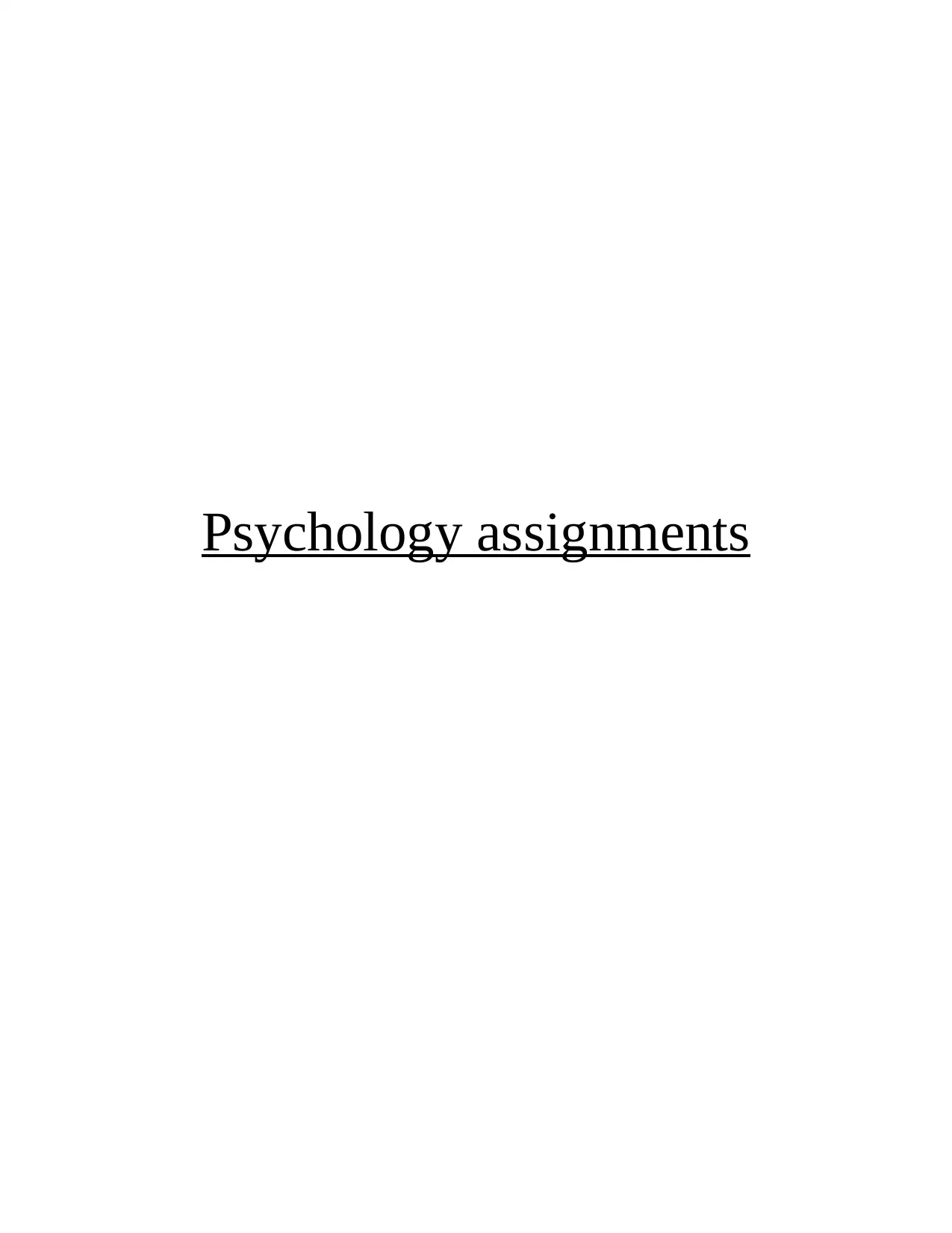
Psychology assignments
Paraphrase This Document
Need a fresh take? Get an instant paraphrase of this document with our AI Paraphraser

TABLE OF CONTENTS
3. Pay it Forward .............................................................................................................................3
REFERENCES ...............................................................................................................................6
3. Pay it Forward .............................................................................................................................3
REFERENCES ...............................................................................................................................6
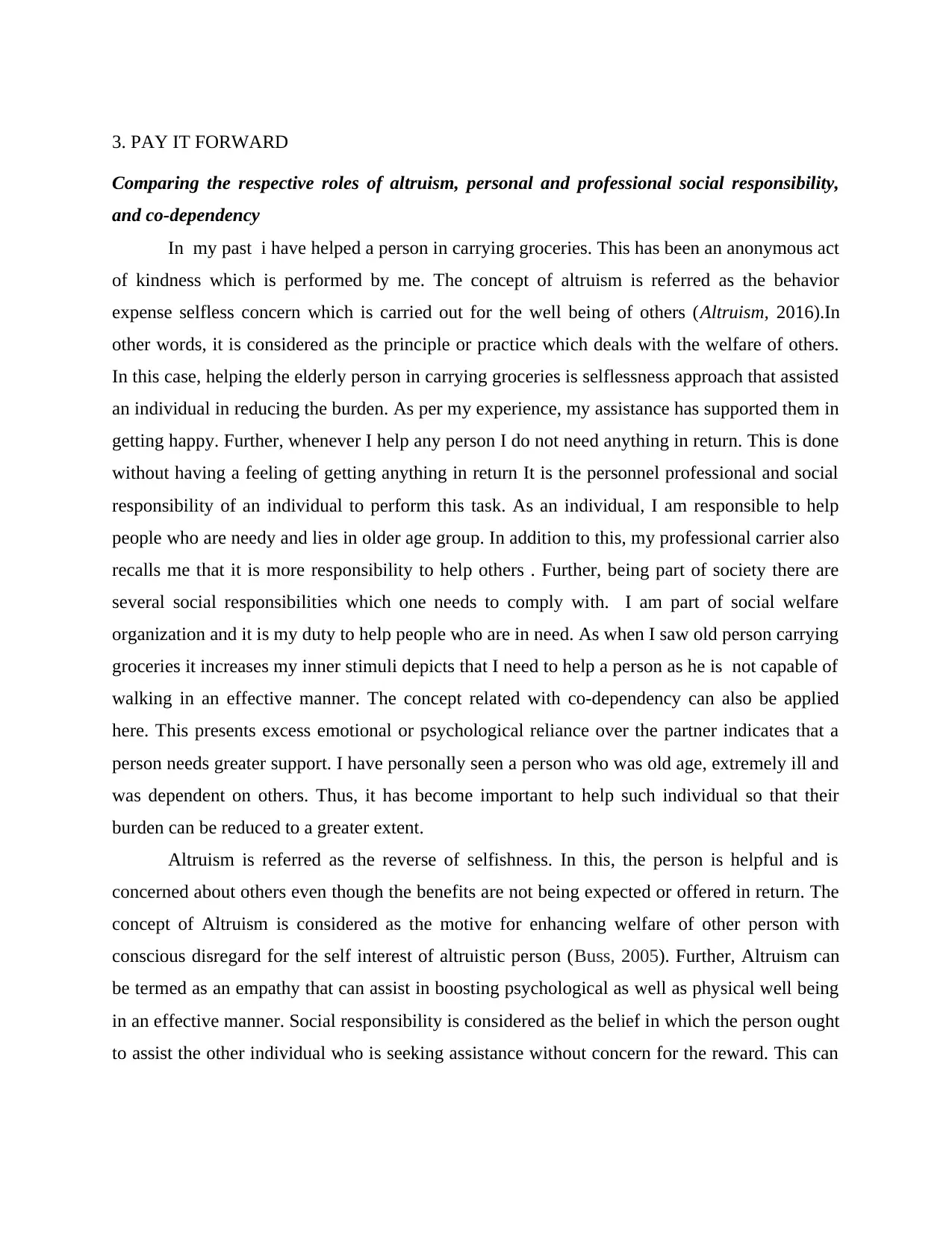
3. PAY IT FORWARD
Comparing the respective roles of altruism, personal and professional social responsibility,
and co-dependency
In my past i have helped a person in carrying groceries. This has been an anonymous act
of kindness which is performed by me. The concept of altruism is referred as the behavior
expense selfless concern which is carried out for the well being of others (Altruism, 2016).In
other words, it is considered as the principle or practice which deals with the welfare of others.
In this case, helping the elderly person in carrying groceries is selflessness approach that assisted
an individual in reducing the burden. As per my experience, my assistance has supported them in
getting happy. Further, whenever I help any person I do not need anything in return. This is done
without having a feeling of getting anything in return It is the personnel professional and social
responsibility of an individual to perform this task. As an individual, I am responsible to help
people who are needy and lies in older age group. In addition to this, my professional carrier also
recalls me that it is more responsibility to help others . Further, being part of society there are
several social responsibilities which one needs to comply with. I am part of social welfare
organization and it is my duty to help people who are in need. As when I saw old person carrying
groceries it increases my inner stimuli depicts that I need to help a person as he is not capable of
walking in an effective manner. The concept related with co-dependency can also be applied
here. This presents excess emotional or psychological reliance over the partner indicates that a
person needs greater support. I have personally seen a person who was old age, extremely ill and
was dependent on others. Thus, it has become important to help such individual so that their
burden can be reduced to a greater extent.
Altruism is referred as the reverse of selfishness. In this, the person is helpful and is
concerned about others even though the benefits are not being expected or offered in return. The
concept of Altruism is considered as the motive for enhancing welfare of other person with
conscious disregard for the self interest of altruistic person (Buss, 2005). Further, Altruism can
be termed as an empathy that can assist in boosting psychological as well as physical well being
in an effective manner. Social responsibility is considered as the belief in which the person ought
to assist the other individual who is seeking assistance without concern for the reward. This can
Comparing the respective roles of altruism, personal and professional social responsibility,
and co-dependency
In my past i have helped a person in carrying groceries. This has been an anonymous act
of kindness which is performed by me. The concept of altruism is referred as the behavior
expense selfless concern which is carried out for the well being of others (Altruism, 2016).In
other words, it is considered as the principle or practice which deals with the welfare of others.
In this case, helping the elderly person in carrying groceries is selflessness approach that assisted
an individual in reducing the burden. As per my experience, my assistance has supported them in
getting happy. Further, whenever I help any person I do not need anything in return. This is done
without having a feeling of getting anything in return It is the personnel professional and social
responsibility of an individual to perform this task. As an individual, I am responsible to help
people who are needy and lies in older age group. In addition to this, my professional carrier also
recalls me that it is more responsibility to help others . Further, being part of society there are
several social responsibilities which one needs to comply with. I am part of social welfare
organization and it is my duty to help people who are in need. As when I saw old person carrying
groceries it increases my inner stimuli depicts that I need to help a person as he is not capable of
walking in an effective manner. The concept related with co-dependency can also be applied
here. This presents excess emotional or psychological reliance over the partner indicates that a
person needs greater support. I have personally seen a person who was old age, extremely ill and
was dependent on others. Thus, it has become important to help such individual so that their
burden can be reduced to a greater extent.
Altruism is referred as the reverse of selfishness. In this, the person is helpful and is
concerned about others even though the benefits are not being expected or offered in return. The
concept of Altruism is considered as the motive for enhancing welfare of other person with
conscious disregard for the self interest of altruistic person (Buss, 2005). Further, Altruism can
be termed as an empathy that can assist in boosting psychological as well as physical well being
in an effective manner. Social responsibility is considered as the belief in which the person ought
to assist the other individual who is seeking assistance without concern for the reward. This can
⊘ This is a preview!⊘
Do you want full access?
Subscribe today to unlock all pages.

Trusted by 1+ million students worldwide
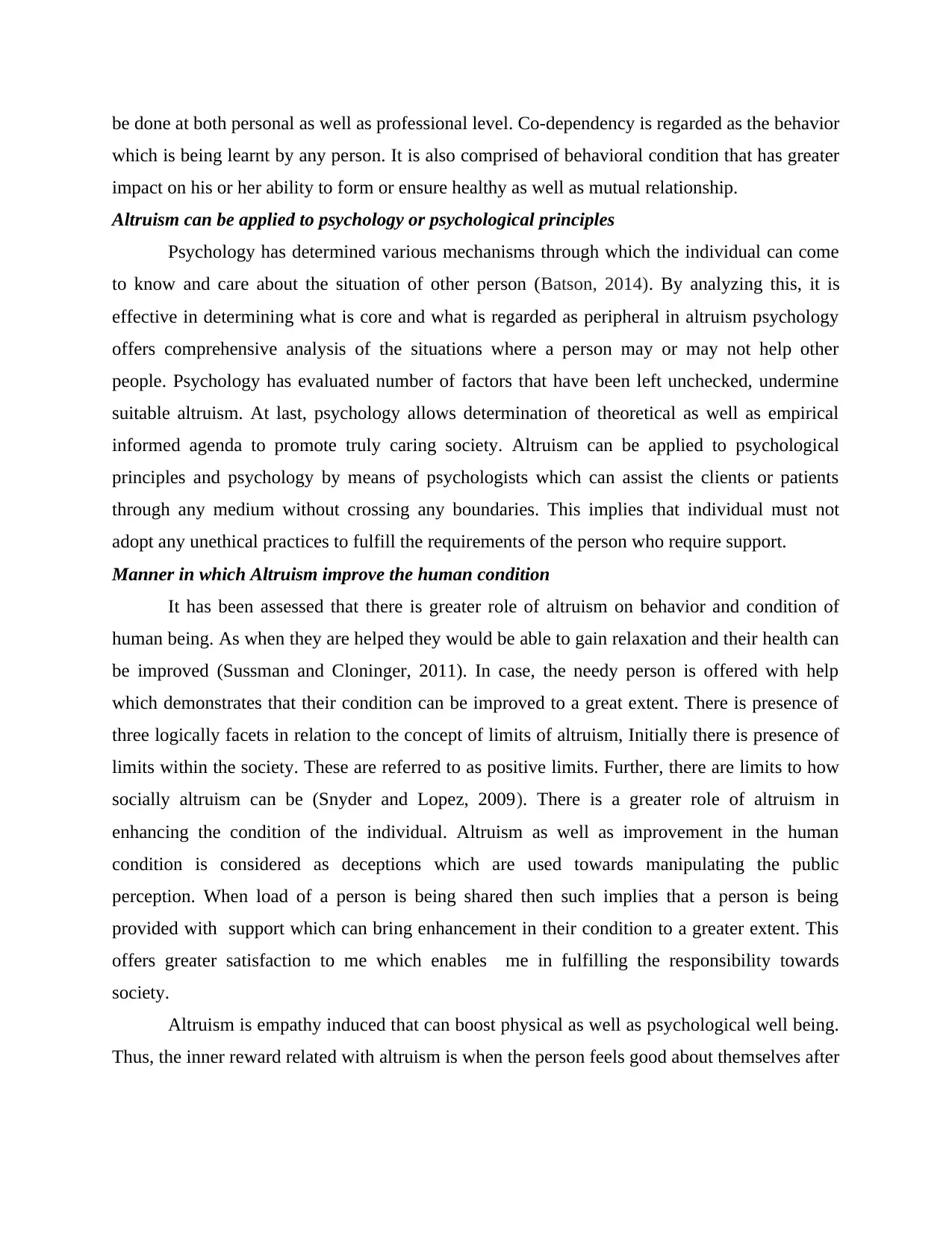
be done at both personal as well as professional level. Co-dependency is regarded as the behavior
which is being learnt by any person. It is also comprised of behavioral condition that has greater
impact on his or her ability to form or ensure healthy as well as mutual relationship.
Altruism can be applied to psychology or psychological principles
Psychology has determined various mechanisms through which the individual can come
to know and care about the situation of other person (Batson, 2014). By analyzing this, it is
effective in determining what is core and what is regarded as peripheral in altruism psychology
offers comprehensive analysis of the situations where a person may or may not help other
people. Psychology has evaluated number of factors that have been left unchecked, undermine
suitable altruism. At last, psychology allows determination of theoretical as well as empirical
informed agenda to promote truly caring society. Altruism can be applied to psychological
principles and psychology by means of psychologists which can assist the clients or patients
through any medium without crossing any boundaries. This implies that individual must not
adopt any unethical practices to fulfill the requirements of the person who require support.
Manner in which Altruism improve the human condition
It has been assessed that there is greater role of altruism on behavior and condition of
human being. As when they are helped they would be able to gain relaxation and their health can
be improved (Sussman and Cloninger, 2011). In case, the needy person is offered with help
which demonstrates that their condition can be improved to a great extent. There is presence of
three logically facets in relation to the concept of limits of altruism, Initially there is presence of
limits within the society. These are referred to as positive limits. Further, there are limits to how
socially altruism can be (Snyder and Lopez, 2009). There is a greater role of altruism in
enhancing the condition of the individual. Altruism as well as improvement in the human
condition is considered as deceptions which are used towards manipulating the public
perception. When load of a person is being shared then such implies that a person is being
provided with support which can bring enhancement in their condition to a greater extent. This
offers greater satisfaction to me which enables me in fulfilling the responsibility towards
society.
Altruism is empathy induced that can boost physical as well as psychological well being.
Thus, the inner reward related with altruism is when the person feels good about themselves after
which is being learnt by any person. It is also comprised of behavioral condition that has greater
impact on his or her ability to form or ensure healthy as well as mutual relationship.
Altruism can be applied to psychology or psychological principles
Psychology has determined various mechanisms through which the individual can come
to know and care about the situation of other person (Batson, 2014). By analyzing this, it is
effective in determining what is core and what is regarded as peripheral in altruism psychology
offers comprehensive analysis of the situations where a person may or may not help other
people. Psychology has evaluated number of factors that have been left unchecked, undermine
suitable altruism. At last, psychology allows determination of theoretical as well as empirical
informed agenda to promote truly caring society. Altruism can be applied to psychological
principles and psychology by means of psychologists which can assist the clients or patients
through any medium without crossing any boundaries. This implies that individual must not
adopt any unethical practices to fulfill the requirements of the person who require support.
Manner in which Altruism improve the human condition
It has been assessed that there is greater role of altruism on behavior and condition of
human being. As when they are helped they would be able to gain relaxation and their health can
be improved (Sussman and Cloninger, 2011). In case, the needy person is offered with help
which demonstrates that their condition can be improved to a great extent. There is presence of
three logically facets in relation to the concept of limits of altruism, Initially there is presence of
limits within the society. These are referred to as positive limits. Further, there are limits to how
socially altruism can be (Snyder and Lopez, 2009). There is a greater role of altruism in
enhancing the condition of the individual. Altruism as well as improvement in the human
condition is considered as deceptions which are used towards manipulating the public
perception. When load of a person is being shared then such implies that a person is being
provided with support which can bring enhancement in their condition to a greater extent. This
offers greater satisfaction to me which enables me in fulfilling the responsibility towards
society.
Altruism is empathy induced that can boost physical as well as psychological well being.
Thus, the inner reward related with altruism is when the person feels good about themselves after
Paraphrase This Document
Need a fresh take? Get an instant paraphrase of this document with our AI Paraphraser
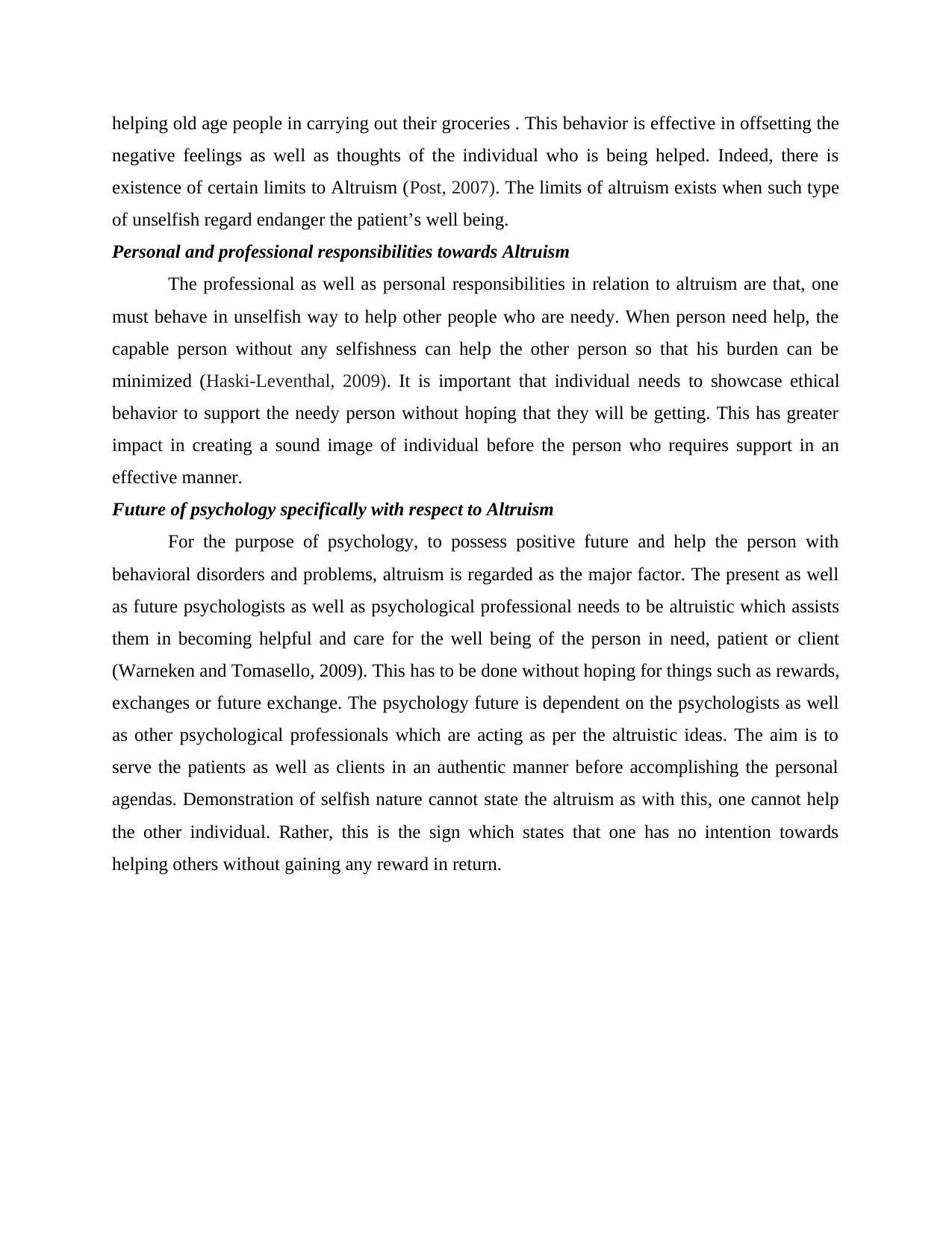
helping old age people in carrying out their groceries . This behavior is effective in offsetting the
negative feelings as well as thoughts of the individual who is being helped. Indeed, there is
existence of certain limits to Altruism (Post, 2007). The limits of altruism exists when such type
of unselfish regard endanger the patient’s well being.
Personal and professional responsibilities towards Altruism
The professional as well as personal responsibilities in relation to altruism are that, one
must behave in unselfish way to help other people who are needy. When person need help, the
capable person without any selfishness can help the other person so that his burden can be
minimized (Haski‐Leventhal, 2009). It is important that individual needs to showcase ethical
behavior to support the needy person without hoping that they will be getting. This has greater
impact in creating a sound image of individual before the person who requires support in an
effective manner.
Future of psychology specifically with respect to Altruism
For the purpose of psychology, to possess positive future and help the person with
behavioral disorders and problems, altruism is regarded as the major factor. The present as well
as future psychologists as well as psychological professional needs to be altruistic which assists
them in becoming helpful and care for the well being of the person in need, patient or client
(Warneken and Tomasello, 2009). This has to be done without hoping for things such as rewards,
exchanges or future exchange. The psychology future is dependent on the psychologists as well
as other psychological professionals which are acting as per the altruistic ideas. The aim is to
serve the patients as well as clients in an authentic manner before accomplishing the personal
agendas. Demonstration of selfish nature cannot state the altruism as with this, one cannot help
the other individual. Rather, this is the sign which states that one has no intention towards
helping others without gaining any reward in return.
negative feelings as well as thoughts of the individual who is being helped. Indeed, there is
existence of certain limits to Altruism (Post, 2007). The limits of altruism exists when such type
of unselfish regard endanger the patient’s well being.
Personal and professional responsibilities towards Altruism
The professional as well as personal responsibilities in relation to altruism are that, one
must behave in unselfish way to help other people who are needy. When person need help, the
capable person without any selfishness can help the other person so that his burden can be
minimized (Haski‐Leventhal, 2009). It is important that individual needs to showcase ethical
behavior to support the needy person without hoping that they will be getting. This has greater
impact in creating a sound image of individual before the person who requires support in an
effective manner.
Future of psychology specifically with respect to Altruism
For the purpose of psychology, to possess positive future and help the person with
behavioral disorders and problems, altruism is regarded as the major factor. The present as well
as future psychologists as well as psychological professional needs to be altruistic which assists
them in becoming helpful and care for the well being of the person in need, patient or client
(Warneken and Tomasello, 2009). This has to be done without hoping for things such as rewards,
exchanges or future exchange. The psychology future is dependent on the psychologists as well
as other psychological professionals which are acting as per the altruistic ideas. The aim is to
serve the patients as well as clients in an authentic manner before accomplishing the personal
agendas. Demonstration of selfish nature cannot state the altruism as with this, one cannot help
the other individual. Rather, this is the sign which states that one has no intention towards
helping others without gaining any reward in return.
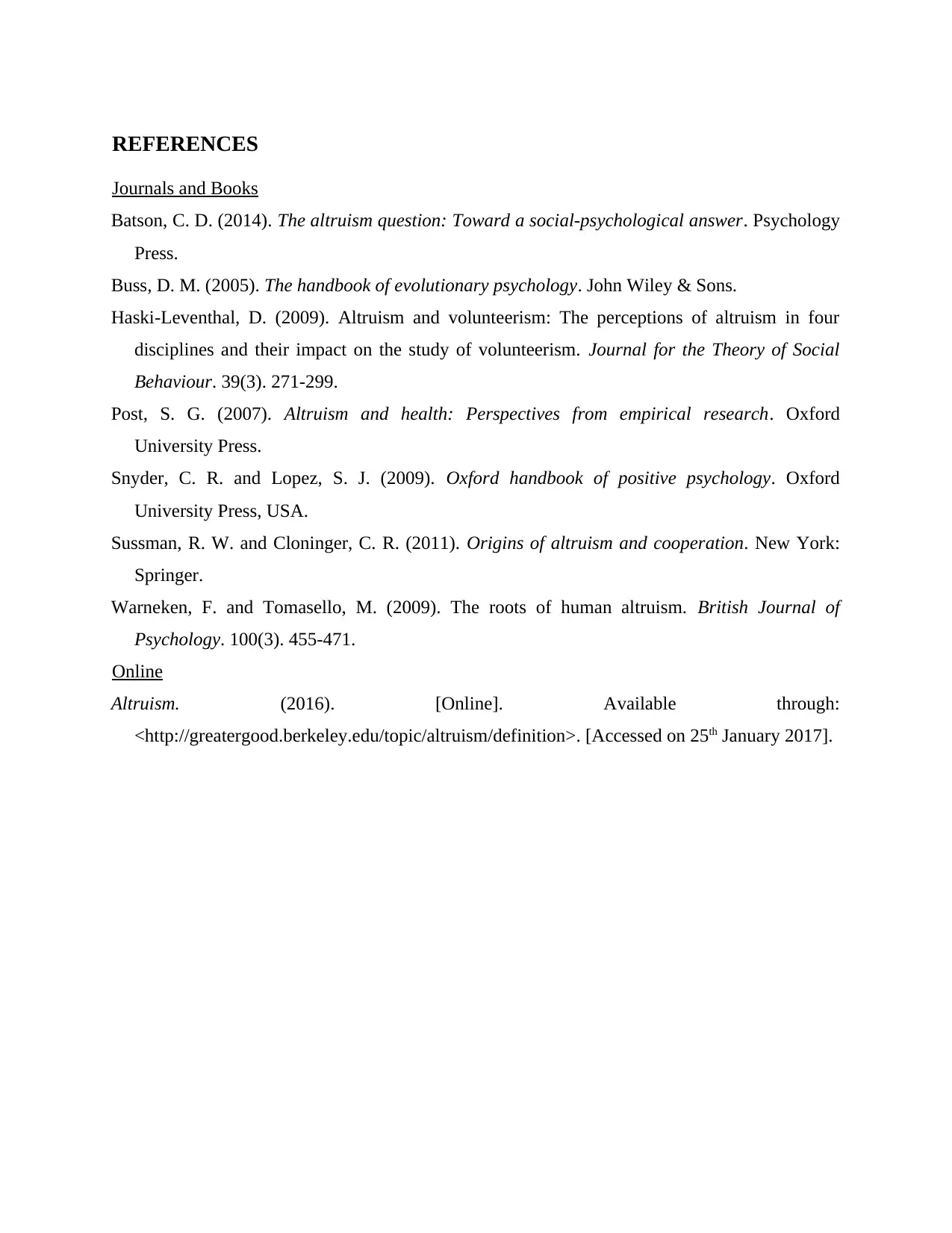
REFERENCES
Journals and Books
Batson, C. D. (2014). The altruism question: Toward a social-psychological answer. Psychology
Press.
Buss, D. M. (2005). The handbook of evolutionary psychology. John Wiley & Sons.
Haski‐Leventhal, D. (2009). Altruism and volunteerism: The perceptions of altruism in four
disciplines and their impact on the study of volunteerism. Journal for the Theory of Social
Behaviour. 39(3). 271-299.
Post, S. G. (2007). Altruism and health: Perspectives from empirical research. Oxford
University Press.
Snyder, C. R. and Lopez, S. J. (2009). Oxford handbook of positive psychology. Oxford
University Press, USA.
Sussman, R. W. and Cloninger, C. R. (2011). Origins of altruism and cooperation. New York:
Springer.
Warneken, F. and Tomasello, M. (2009). The roots of human altruism. British Journal of
Psychology. 100(3). 455-471.
Online
Altruism. (2016). [Online]. Available through:
<http://greatergood.berkeley.edu/topic/altruism/definition>. [Accessed on 25th January 2017].
Journals and Books
Batson, C. D. (2014). The altruism question: Toward a social-psychological answer. Psychology
Press.
Buss, D. M. (2005). The handbook of evolutionary psychology. John Wiley & Sons.
Haski‐Leventhal, D. (2009). Altruism and volunteerism: The perceptions of altruism in four
disciplines and their impact on the study of volunteerism. Journal for the Theory of Social
Behaviour. 39(3). 271-299.
Post, S. G. (2007). Altruism and health: Perspectives from empirical research. Oxford
University Press.
Snyder, C. R. and Lopez, S. J. (2009). Oxford handbook of positive psychology. Oxford
University Press, USA.
Sussman, R. W. and Cloninger, C. R. (2011). Origins of altruism and cooperation. New York:
Springer.
Warneken, F. and Tomasello, M. (2009). The roots of human altruism. British Journal of
Psychology. 100(3). 455-471.
Online
Altruism. (2016). [Online]. Available through:
<http://greatergood.berkeley.edu/topic/altruism/definition>. [Accessed on 25th January 2017].
⊘ This is a preview!⊘
Do you want full access?
Subscribe today to unlock all pages.

Trusted by 1+ million students worldwide
1 out of 6
Related Documents
Your All-in-One AI-Powered Toolkit for Academic Success.
+13062052269
info@desklib.com
Available 24*7 on WhatsApp / Email
![[object Object]](/_next/static/media/star-bottom.7253800d.svg)
Unlock your academic potential
Copyright © 2020–2025 A2Z Services. All Rights Reserved. Developed and managed by ZUCOL.





